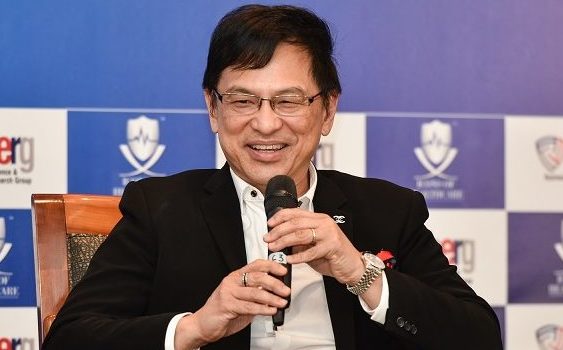Dr. Timothy Low, Head of Medical Affairs (Asia Pacific) – Shire
Having lost his family and few close friends to illness and diseases, Dr. Timothy’s interest in healthcare is more personal than professional. It fuels his desire, drive and passion to do whatever he can, to make a difference, even if it is just that little bit better, for people every day.
Dr. Timothy Low did not have the luxury of a privileged childhood. His first-hand tryst with illness affecting the entire family that lived in a rented room and the landlord suffering from a terminal disease firmed up his interest to explore more in healthcare and get out of the agony. These experiences threw realizations on how healthcare comprised of much more than just clinical science.
The former CEO of Farrer Park Hospital and Glenagles Hospital Singapore, Dr. Timothy presently leads the Medical Affairs team at Shire, providing scientific knowledge to healthcare professionals. The team focusses to generate real world evidence and works with doctors to provide the necessary treatment options for Rare Disease patients. “The patient journey is long and arduous in Rare Diseases. We seek to improve the lives of these patients so that they can have a better quality of life and a more meaningful journey as we walk with them”, says Dr. Timothy Low.
Recently awarded the “Rare Disease Champion Provider of the Year” in Asia Pacific 2018 for Shire and “Leading Healthcare Management Professional” by Icons of Healthcare 2018, Dr. Timothy says “the award recognizes his efforts for pushing the boundaries of delighting customers at every stage and in every interaction. It also measures customer sentiments across various touch points and throughout the customer life cycle”.
The team has embarked on a new initiative in 2018 – to use Artificial Intelligence to shorten the diagnostic odyssey of Rare Diseases. The aim is to reduce the time to an accurate diagnosis in children with Rare Diseases.
Team ABT captures some more insights from his journey in this interview below.
Healthcare systems & deliveries have undergone transformation in the last decade. What according to you has this change impacted the most?
The human and humane aspect of healthcare is under threat with the rise of technology and digitization. Medicine in the past was very much relational. It was more art than science. Today the healthcare professional is separated from the patient, and more and more so with added machines, protocols and lengthy documentation processes. This divide, the lack of relational development between care-givers and patients has removed empathy, understanding and the human connection.
Despite the wealth of knowledge that is growing by leaps and bounds, humans are very much emotionally attached. . No matter how logical & structured, the process is, human beings will react by how they feel. And that is why the Farrer Park Experience that I developed at Farrer Park Hospital is very much all encompassing. We believe technology should be intuitively embedded in the process and the building structure. It must never front the experience. The ambiance, the service, the care and the trust. These are relational aspect that we build with every patient.
The latest technology and the most advanced treatment are the logical science aspect that will attract patients through your doors but it is the relational aspect, these are the elements that make patients stay with you and recommend their loved ones.
What are some of the pioneering initiatives at Farrer Park Hospital, that makes it a leading Medical Destination
Here are some of the key proud milestones of our hospital which officially opened just 2 years ago, in 2016.
- The first hospital in South East Asia to have the Micro-Dose mammogram for reduced radiation and more comfort for mammography.
- The first hospital in South East Asia to have High Intensity Focused Ultrasound treatment for Uterine Fibroid. It is a non-invasive procedure to eliminate fibroids.
- The first private hospital in Singapore to perform the world’s smallest and leadless pacemaker implantation.
- The first hospital in Singapore to do Stereotactic Body Radio Therapy with Active Breathing Control for Lung Cancer, increased accuracy and saving maximum healthy tissues from radiation.
- The first hospital in Singapore to have Makoplasty for hip and knee replacement with robotic precision, saving maximum healthy tissues.
- The first hospital in Singapore to deploy Artificial Intelligence to enhance Data security.
- The first SMART Hospital with seamless integration of a 5-Star Hotel and Specialist Medical Centre in Asia Pacific.
What are your views on the Challenges in ensuring quality Healthcare? How do you overcome them?
How do we keep the quality high with evolving technology and turnover of headcount? In a word, CULTURE.
The culture maintains a healthy ecosystem for the organisation. We need a workforce that is adaptable and embraces change. Driven and passionate about what they do, our people are involved and empowered. It all boils down to people. It is important to select the right ones for the right role, ensure a good assimilation into the ecosystem and then stand back and let them blossom.
What would you like to achieve in the coming years?
To build leaders in Healthcare and leave a legacy. I have been fortunate to have wonderful teams to execute the strategies, achieving many successes. The next phase for me is to focus on Significance. By Significance, I mean touching the lives of others and making a difference. Building leaders at every level of the organisation that I work in. Nurturing trusting relationships. Putting a Caring and Sharing Culture in place.
Culture trumps Strategy. Relationship trumps Culture. A Caring and Sharing Culture needs to be built on Trusting Relationships.


